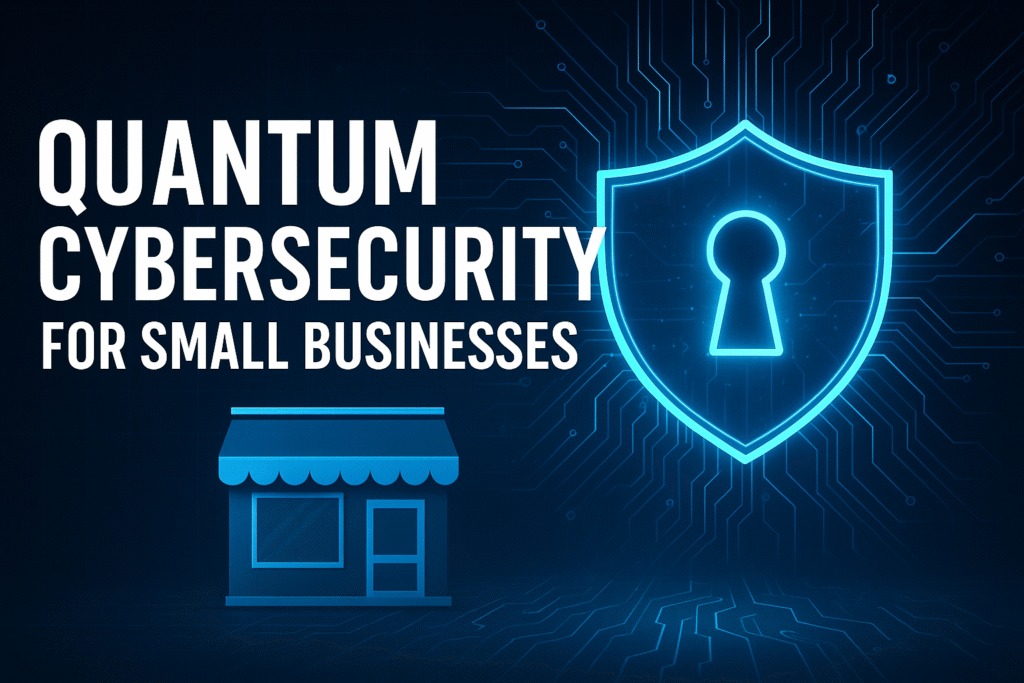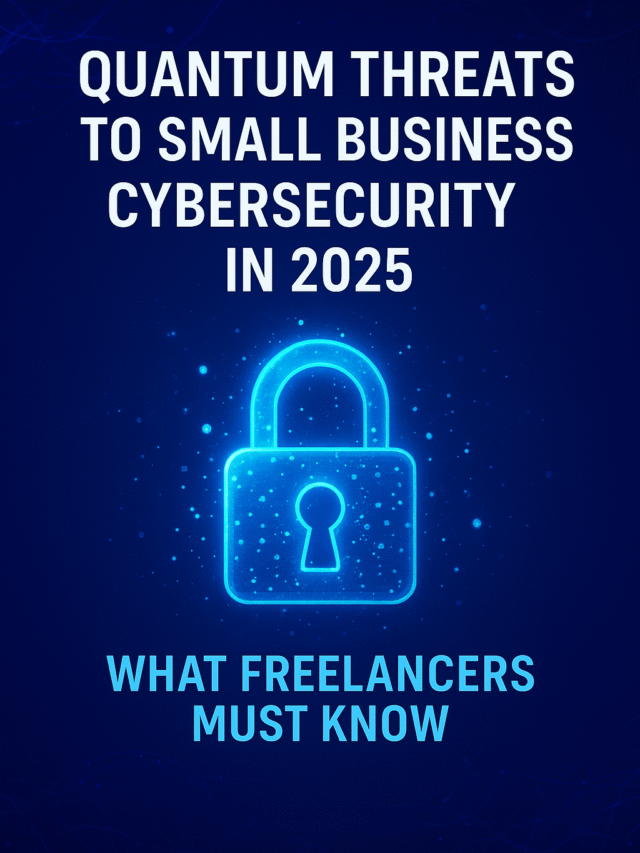
Table of Contents
quantum threats to small business cybersecurity are no longer just something you hear about in sci-fi movies. Quantum computing is advancing fast, and while it promises major breakthroughs, it also creates a new wave of cyber risks that freelancers and small business owners in the U.S. cannot afford to ignore.
In 2025, small businesses are already seeing more targeted attacks, more AI-powered scams, and more data theft attempts. Quantum computing may soon make current encryption methods outdated, which means passwords, client files, payment information, NDAs, and contracts could be easier to crack.
So, what should you know — and how can you protect yourself before quantum technology becomes mainstream?
What Is Quantum Computing (Without the Tech Confusion)?
Quantum computing uses the laws of physics to process information far faster than traditional computers. Instead of normal “bits” (0 or 1), quantum computers use qubits that can be 0 and 1 at the same time.
That means tasks that take today’s computers years could be completed in minutes by a strong quantum computer.
This is exciting for medical research, climate science, and AI innovation — but dangerous for cybersecurity.
⚠ How Quantum Threatens Small Business Cybersecurity
Here’s why quantum threats to small business cybersecurity matter right now:
1️⃣ It can crack current encryption
Most passwords, saved logins, and encrypted business data use encryption methods like RSA and ECC. These could be breakable once quantum computers reach maturity.
2️⃣ Cybercriminals are already collecting data to break later
Hackers are stealing encrypted data today so they can unlock it in the future — known as “harvest now, decrypt later.”
3️⃣ Freelancers and small businesses are easier targets
Large corporations invest millions in cybersecurity. Smaller teams with shared passwords and basic security tools become a prime target.
4️⃣ Client trust and contracts are at risk
A single breach involving client data could lead to legal action, chargebacks, and permanent damage to reputation.
📌 Real-World Example (Simplified)
Imagine a freelancer who stores:
✔ client identity documents
✔ login access
✔ payment records
✔ NDA-protected information
A hacker could:
- Steal encrypted files today
- Wait for quantum decryption methods
- Sell or leak the data later
This is why the U.S. government, major cloud companies, and tech firms are already preparing.
🛡 What Is Post-Quantum Security?
Post-quantum security means using encryption methods that even quantum computers cannot easily break.
Organizations like NIST (National Institute of Standards and Technology) are working on new encryption standards designed to resist quantum attacks. You can learn about their current recommendations here:
https://csrc.nist.gov/projects/post-quantum-cryptography
Companies such as Cloudflare are already testing post-quantum encryption in their network infrastructure. Source:
https://blog.cloudflare.com/tag/post-quantum-crypto/
How Freelancers & Small Businesses Can Prepare (Action Steps)
🔐 1. Start using strong password managers
Instead of repeating passwords or saving them in a notebook, use tools like:
- Bitwarden
- 1Password
- Dashlane
Password managers can help you switch to stronger, longer passphrases that are much harder to break.
🎫 2. Turn on multi-factor authentication (MFA)
Prefer app-based authentication (Authy, Google Authenticator) instead of SMS codes.
📦 3. Encrypt files before sending to clients
Use tools like:
- Proton Drive
- Tresorit
- Cryptomator (for encrypted folders)
📬 4. Switch to secure, privacy-focused email
Proton Mail and Tutanota offer more secure encryption than many standard email providers.
5. Ask your software providers about post-quantum plans
Before storing sensitive client files in a platform, check if they are adopting post-quantum encryption in the near future.
Industries at Higher Risk
| Freelancers / Small Biz Sectors | Why Quantum Threat Is High |
|---|---|
| Legal & Consulting | Sensitive client documents |
| Healthcare & Therapy | HIPAA compliance and medical data |
| Accounting & Tax prep | Financial records & IDs |
| Real Estate | Loan, identity, and contract data |
| SaaS & AI service providers | Software code theft & IP loss |
🗣 How to Talk About This With Clients
Suggested message you can send to your clients:
“I am improving my security to prepare for emerging quantum cybersecurity risks. This protects your data from long-term decryption threats and ensures compliance with future security standards.”
This builds trust and positions you as a responsible professional.
The Future of Post-Quantum Cybersecurity
Quantum computing may take a few more years before it becomes a standard tool—but once it does, U.S small businesses that did nothing to protect their data may face:
❌ Data exposure
❌ Contract violations
❌ Legal liabilities
❌ Client loss and reputation damage
Freelancers and small companies who prepare early will become the trusted, secure choice in their industry.
🏁 Conclusion
Quantum threats to small business cybersecurityin U.S are not a distant problem — preparation begins now. Freelancers and small business owners in the U.S. should start transitioning to stronger security habits before quantum computers can break today’s encryption.
To protect yourself and your clients:
🔹 Use a password manager
🔹 Turn on multi-factor authentication
🔹 Encrypt files and email communication
🔹 Choose tools preparing for post-quantum security
The businesses that survive the next cybersecurity era won’t be the biggest — they will be the ones who prepared.
If you want a checklist, tool recommendations, or help improving your cybersecurity setup, comment below or reach out for guidance. Stay safe and stay ahead of the threats.
You may also like this bog : Deepfakes, Social Engineering & Personal Brand Risk: What Every Freelancer Should Fear
FAQs
1. What are the biggest quantum threats to small business cybersecurity in 2025?
Quantum computers are evolving fast, and they can break traditional encryption methods that small businesses rely on today. This makes sensitive client data, financial records, and even emails vulnerable. Freelancers and small business owners need to understand these quantum threats to small business cybersecurity to stay ahead of potential attacks.
2. How can post-quantum cybersecurity protect my business?
Post-quantum cybersecurity is all about using encryption methods designed to resist quantum attacks. By adopting post-quantum encryption, small businesses and freelancers can keep client data, contracts, and communications secure, even against future quantum computing threats. Investing in these protections now can save headaches later.
3. What quantum computing cybersecurity risks should freelancers be aware of?
Quantum computing introduces risks that go beyond traditional hacking. For freelancers handling sensitive client files, contracts, or payment information, these risks include encrypted data being cracked faster than ever. Staying informed and implementing quantum-resistant solutions is critical for long-term security.
4. Is quantum encryption practical for small businesses?
Yes! Quantum encryption, including techniques like Quantum Key Distribution (QKD), offers cutting-edge protection that makes intercepted data unreadable. Small businesses and freelancers who adopt quantum encryption can significantly reduce the chances of cyberattacks, giving clients peace of mind and boosting trust.
5. Why is post-quantum encryption essential for freelancers and small businesses?
Post-quantum encryption uses cryptographic algorithms designed to withstand attacks from quantum computers. For freelancers and small business owners, this means securing client data, safe online communication, and worry-free file sharing, even as quantum computing advances. It’s the future-proof way to protect your business.


Pingback: Supply Chain Attacks: Why a Freelancer’s Third-Party Vendor Might Be the Weak Link (2025)